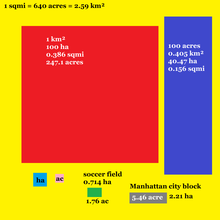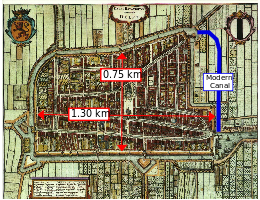This is an old revision of this page, as edited by Alon Alush (talk | contribs) at 12:35, 17 April 2024 (→top: clean up). The present address (URL) is a permanent link to this revision, which may differ significantly from the current revision.
Revision as of 12:35, 17 April 2024 by Alon Alush (talk | contribs) (→top: clean up)(diff) ← Previous revision | Latest revision (diff) | Newer revision → (diff) Unit of area| square kilometre | |
|---|---|
 The square kilometre (red square) compared to other areas, including a square mile (the entire yellow square) The square kilometre (red square) compared to other areas, including a square mile (the entire yellow square) | |
| General information | |
| Unit system | SI units |
| Unit of | area |
| Symbol | km |
| Conversions | |
| 1 km in ... | ... is equal to ... |
| SI units |
|
| Imperial/US |
|
The square kilometre (square kilometer in American spelling; symbol: km) is a multiple of the square metre, the SI unit of area or surface area.
1 km is equal to:
- 1,000,000 square metres (m)
- 100 hectares (ha)
It is also approximately equal to:
- 0.3861 square miles
- 247.1 acres
Conversely:
- 1 m = 0.000001 (10) km
- 1 hectare = 0.01 (10) km
- 1 square mile = 2.5899 km
- 1 acre = about 0.004047 km
The symbol "km" means (km), square kilometre or kilometre squared and not k(m), kilo–square metre. For example, 3 km is equal to 3×(1,000m) = 3,000,000 m, not 3,000 m.
Examples of areas of 1 square kilometre
Topographical map grids

Topographical map grids are worked out in metres, with the grid lines being 1,000 metres apart.
- 1:100,000 maps are divided into squares representing 1 km, each square on the map being one square centimetre in area and representing 1 km on the surface of the Earth.
- For 1:50,000 maps, the grid lines are 2 cm apart. Each square on the map is 2 cm by 2 cm (4 cm) and represents 1 km on the surface of the Earth.
- For 1:25,000 maps, the grid lines are 4 cm apart. Each square on the map is 4 cm by 4 cm (16 cm) and represents 1 km on the surface of the Earth.
In each case, the grid lines enclose one square kilometre.
Medieval city centres

The area enclosed by the walls of many European medieval cities were about one square kilometre. These walls are often either still standing or the route they followed is still clearly visible, such as in Brussels, where the wall has been replaced by a ring road, or in Frankfurt, where the wall has been replaced by gardens. The approximate area of the old walled cities can often be worked out by fitting the course of the wall to a rectangle or an oval (ellipse). Examples include:
- Delft, Netherlands (See map alongside) 52°0′54″N 4°21′34″E / 52.01500°N 4.35944°E / 52.01500; 4.35944
- The walled city of Delft was approximately rectangular.
- The approximate length of rectangle was about 1.30 kilometres (0.81 mi).
- The approximate width of the rectangle was about 0.75 kilometres (0.47 mi).
- A perfect rectangle with these measurements has an area of 1.30×0.75 = 0.9 km
- The medieval city is roughly rectangular with rounded north-east and north-west corners.
- The maximum distance from east to west is 1.36 kilometres (0.85 mi).
- The maximum distance from north to south is 0.80 kilometres (0.50 mi).
- A perfect rectangle of these dimensions would be 1.36×0.80 = 1.088 km.
- The medieval city of Bruges, a major centre in Flanders, was roughly oval or elliptical in shape with the longer or semi-major axis running north and south.
- The maximum distance from north to south (semi-major axis) is 2.53 kilometres (1.57 mi).
- The maximum distance from east to west (semi-minor axis) is 1.81 kilometres (1.12 mi).
- A perfect ellipse of these dimensions would be 2.53 × 1.81 × (π/4) = 3.597 km.
- Chester is one of the smaller English cities that has a near-intact city wall.
Parks
Parks come in all sizes; a few are almost exactly one square kilometre in area. Here are some examples:
- Riverside Country Park, UK.
- Brierley Forest Park, UK.
- Rio de Los Angeles State Park, California, US
- Jones County Central Park, Iowa, US.
- Kiest Park, Dallas, Texas, US
- Hole-in-the-Wall Park & Campground, Grand Manan Island, Bay of Fundy, New Brunswick, Canada
- Downing Provincial Park, British Columbia, Canada
- Citadel Park, Poznan, Poland
- Sydney Olympic Park, Sydney, Australia, contains 6.63 square kilometres of wetlands and waterways.
Golf courses
Using the figures published by golf course architects Crafter and Mogford, a course should have a fairway width of 120 metres and 40 metres clear beyond the hole. Assuming a 6,000-metre (6,600 yd) 18-hole course, an area of 80 hectares (0.8 square kilometre) needs to be allocated for the course itself. Examples of golf courses that are about one square kilometre include:
- Manchester Golf Club, UK
- Northop Country Park, Wales, UK
- The Trophy Club, Lebanon, Indiana, US
- Qingdao International Country Golf Course, Qingdao, Shandong, China
- Arabian Ranches Golf Club, Dubai
- Sharm el Sheikh Golf Courses: Sharm el Sheikh, South Sinai, Egypt
- Belmont Golf Club, Lake Macquarie, NSW, Australia
Other areas of one square kilometre or thereabouts
- The Old City of Jerusalem is almost 1 square kilometre in area.
- Milton Science Park, Oxfordshire, UK.
- Mielec Industrial Park, Mielec, Poland
- The Guildford Campus of Guildford Grammar School, South Guildford, Western Australia
- Sardar Vallabhbhai National Institute of Technology (SVNIT), Surat, India
- Île aux Cerfs Island, near the east coast of Mauritius.
- Peng Chau Island, Hong Kong
See also
- Conversion of units
- SI prefix for the precise meaning of the prefix "k"
- Square Kilometre Array, a proposed radio telescope in South Africa or Australia, which is intended to have a collecting area of approximately 1 km
Notes
- Assume that each hole requires (6000÷18 + 40) = 373 metres in length. The area needed is (18 × 373 × 120 ÷ 10,000) = 80.64 ha (1 hectare = 10,000 square metres).
References
- ^ "UnitConversion.org Area Converter". web page. UnitConversion.org. 2009. Retrieved 4 July 2012.
- There are 0.386102159 international square miles in a square kilometer while there are 0.386100614 US Survey square miles in the same measure. This is because the US Survey measures are very slightly larger than the international measures.
- There are 247.105381467 international acres in a square kilometre while there are only 247.104393047 of the very slightly larger US Survey acres.
- An International square mile equals 2.58998811 km while the slightly larger US Survey square mile equals 2.58999847 km.
- 1 acre (International) = 0.004046856 km while 1 acre (US Survey) = 0.004046873 km
- ^ Measurements taken from Google Earth
- Howe, Steve. "Chester: A Virtual Stroll around the Walls". Retrieved 7 October 2012.
- "Medway Council Riverside Country Park". web page. Medway Council. 2012. Archived from the original on 19 April 2012. Retrieved 9 June 2012.
- "Ashfield Brierley Forest Park". web page. Ashfield District Council. 2012. Archived from the original on 8 November 2012. Retrieved 9 June 2012.
- "California Department of Parks and Recreation Rio de Los Angeles State Park". web page. State of California. 2012. Retrieved 9 June 2012.
- "Parks & Recreation Central Park, Center Junction, Iowa". web page. Jones County Tourism Association. Retrieved 9 June 2012.
- "A History of Kiest Park". web page. Friends of Oak Cliff Parks. 2010. Archived from the original on 5 June 2012. Retrieved 9 June 2012.
- "Hole-in-the-Wall Park & Campground". web page. Hole-in-the-Wall Park & Campground. 2012. Retrieved 9 June 2012.
- "BC Parks Downing Provincial Park". web page. British Columbia Ministry of Environment. Retrieved 9 June 2012.
- "Citadel Park". web page. Poland Travel. Retrieved 9 June 2012.
- "Sydney Olympic Park Parklands Fact Sheet". web page. Sydney Olympic Park Authority. Retrieved 9 June 2012.
- "Golf Course Safety" (PDF). Crafter + Mogford, golf course architects. Retrieved 5 October 2012.
- ^ "Visitor Information [Manchester Golf Club]". web page. Manchester Golf Club Ltd. Archived from the original on 25 May 2012. Retrieved 11 June 2012.
- "Welcome to the Trophy Club". web page. The Trophy Club. Retrieved 11 June 2012.
- "Arabian Ranches Golf Club". 7 Days in Dubai. Catchpole Communications FZ-LLC, Al Sidra Media LLC. Archived from the original on 2012-09-08. Retrieved 1 April 2018.
- "Sharm el Sheikh Golf Courses: Sharm el Sheikh, South Sinai, Egypt". web page. TravelSmart Ltd: World Guides. Retrieved 11 June 2012.
- "Belmont Golf Club, Lake Macquarie, History". web page. Belmont Golf Club. Retrieved 11 June 2012.
- "Jerusalem - The Old City". web page. The American-Israeli Cooperative Enterprise. 2012. Retrieved 6 July 2012. Actually, about 89 hectares.
- "Science Vale UK". web page. Abbey House. Retrieved 7 July 2012.
- "Invest in Poland". web page. Polish information and foreign investment agency. Retrieved 7 July 2012.
- "Guildford Grammar School". waterhall.com.au. Archived from the original on 10 April 2013. Retrieved 2 April 2018.
- "39th National Conference on Fluid Mechanics and Fluid Power". web page. Department of Mechanical Engineering, Sardar Vallabhbhai National Institute of Technology (SVNIT). Archived from the original on 19 July 2012. Retrieved 7 July 2012.
- "MauritiusAttraction". Amity Institute of Higher Education, Mauritius. Amity Institute of Higher Education. 2011. Archived from the original on 12 October 2013. Retrieved 27 June 2013.
- "Peng Chau<Leisure Line - Barrier-Free Information Website - Hong Kong Federation of Handicapped Youth". e-cgo.org.hk.